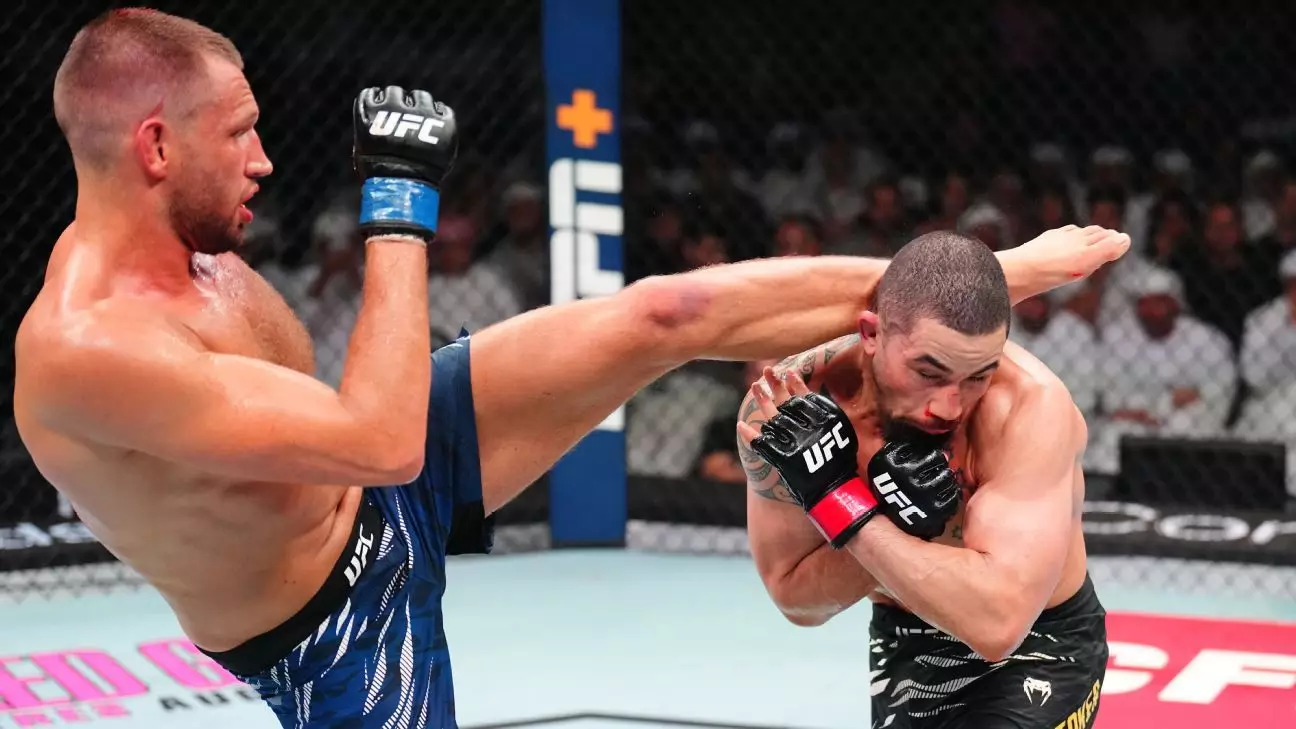Reinier de Ridder’s stunning victory over Robert Whittaker is a testament to the shifting landscape of the UFC middleweight division. Crossing the threshold from promising contender to serious title challenger, de Ridder’s performance signals a new era where relentless pressure and strategic grappling can overcome even the most seasoned fighters. His win wasn’t just about the scorecards; it was a demonstration of tactical brilliance blended with tenacity, showcasing his readiness to take on the sport’s giants.
In a contest that kept fans on the edge of their seats, de Ridder’s astonishing volume of strikes and controlled aggression contrasted sharply with Whittaker’s resilience. While the judges’ split decision reflected how narrow the margin was, the statistical dominance communicated a different story — one that underscored de Ridder’s capacity to dictate the fight’s tempo. Landing 169 strikes compared to Whittaker’s 100, de Ridder displayed a work rate many fighters aspire to emulate, effectively wearing down a known finisher with relentless volume and pressure.
The Art of Control and Resilience
De Ridder’s approach wasn’t solely rooted in striking; his grappling pedigree established him as a versatile threat. Although Whittaker defended most takedown attempts—13 out of 15—de Ridder’s ability to maintain control was what truly dictated the fight’s rhythm. His control time exceeded nine minutes, positioning him advantageously, whether along the cage or on the canvas. Blood, sweat, and perseverance marked the bout, as de Ridder pressed forward through adversity.
Whittaker’s resilience shone brightest in the third round, where he managed to drop de Ridder with a perfect counter right. That moment proved Whittaker’s championship qualities—never retreating, always threatening. Yet the overall narrative was de Ridder’s resilience, absorbing the damage, weathering the storm, and rallying in the final rounds. His endurance and mental toughness illustrated that his confidence isn’t merely based on talent but on grit and intestinal fortitude.
Challenging Traditional Boundaries in MMA
De Ridder’s career trajectory exemplifies the rising influence of fighters who blend multiple disciplines seamlessly. With a record that includes 14 submission victories, he’s a striking embodiment of modern MMA—a hybrid threat capable of ending fights on the ground or via brutal ground-and-pound. His recent victories against Kevin Holland and Bo Nickal—both highly regarded prospects—highlight his capacity to perform under major spotlight, cementing his place among the division’s elite.
This year’s breakout has positioned him as a genuine contender, but it also raises questions about how the division’s hierarchy might evolve. His callout of Khamzat Chimaev and Dricus Du Plessis indicates a desire to test himself against the top-tier fighters, not content with merely climbing the rankings. It’s a declaration of ambition that could reshape narratives and rivalries in the middleweight division, adding a layer of excitement and unpredictability.
Whittaker’s Endurance and Future Challenges
For Whittaker, this loss marks a significant moment, especially as it’s his first back-to-back defeat since 2013. Known for his durability and high fight IQ, the Australian veteran now faces a period of reflection and recalibration. His ability to bounce back will be crucial if he hopes to recapture his former glory. Meanwhile, his resilience during Saturday’s contest demonstrated why he’s still a formidable opponent, despite recent setbacks.
In a broader sense, his first loss to a rising contender like de Ridder signals a potential shift. Whittaker’s recent struggles might force him to reconsider his approach, possibly refining his striking defense or adjusting game plans to better handle pressure fighters. His future in the division remains bright, but the landscape is beginning to tilt toward fighters who combine grit with relentless volume—an area where de Ridder currently excels.
The Shifting Power Dynamics in the Middleweight Realm
De Ridder’s ascent isn’t just about one win; it’s indicative of a bigger trend. The middleweight division is ripe for a fresh champion—someone who can combine unyielding pressure, tactical versatility, and a hunger to innovate. His performance against a hard-nosed veteran like Whittaker proves he possesses all these qualities.
His immediate call for a title shot against the winner of the upcoming Du Plessis vs. Chimaev fight signals his desire to heighten his profile quickly. While that may seem ambitious, it’s an achievable goal given his recent trajectory. This move represents the fierce confidence of a fighter hungry for glory, unafraid to challenge the division’s established order. Whether he can translate this momentum into UFC gold remains to be seen, but his trajectory suggests he’s ready for the challenge of reigning at the highest level.


Leave a Reply